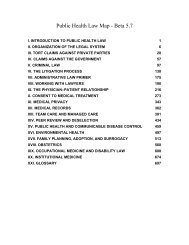Healing a Broken World - Society of Jesus
Healing a Broken World - Society of Jesus
Healing a Broken World - Society of Jesus
Create successful ePaper yourself
Turn your PDF publications into a flip-book with our unique Google optimized e-Paper software.
<strong>Healing</strong> a <strong>Broken</strong> <strong>World</strong><br />
39 ―Lack <strong>of</strong> respect for a loving Creator leads to a denial <strong>of</strong> the dignity <strong>of</strong> the human<br />
person and the wanton destruction <strong>of</strong> the environment‖ (GC 33, D.1, n. 35).<br />
40 As Fr. Kolvenbach acknowledges ―the theme was very broad and would have<br />
required preparatory studies and competent experts; beside the Justice Commission<br />
had to address many other very complex problems; finally, time was limited‖<br />
(Promotio Iustitiae, Ibid, p. 7).<br />
41 The reasons adduced to include the theme <strong>of</strong> ecology in Decree 3 (no. 34) were:<br />
(i) the cry <strong>of</strong> those suffering the consequences <strong>of</strong> environmental destruction; (ii) the<br />
many postulates received (23 coming from 22 provinces some <strong>of</strong> them almost<br />
identical), and (iii) the recent teaching <strong>of</strong> the Holy Father as well as many Episcopal<br />
conferences on this issue (Benedict XVI, Message <strong>of</strong> Peace, 1 January 2010).<br />
42 The two Creation accounts in Genesis 1 and 2 teach us that God designed the<br />
earth as a home fit for the whole <strong>of</strong> creation to live in. In the first Creation account,<br />
God pronounces that all he has created is good. In the second Creation account, it<br />
appears as if God selected the human species for special responsibility. The creation<br />
<strong>of</strong> the human species seems to be the climax <strong>of</strong> God‘s creative act. Furthermore, God<br />
appears to entrust the care <strong>of</strong> the rest <strong>of</strong> creation to the human species (Genesis 1:<br />
28). This responsibility does not imply a greedy and wanton exploitation <strong>of</strong> the<br />
earth‘s resources. Some people have read into this command that God has granted<br />
human beings the licence to ―enjoy and use‖ the environment. Critics <strong>of</strong> this<br />
erroneous understanding <strong>of</strong> the biblical text have suggested that the Bible is partly<br />
to blame for the exploitative and destructive attitude <strong>of</strong> human beings towards the<br />
environment. (Engel, D., Elements in a Theology <strong>of</strong> Environment, Zygon, 5, 5: 216,<br />
1970). The notion <strong>of</strong> stewardship is part <strong>of</strong> the role <strong>of</strong> human beings in relation to<br />
the rest <strong>of</strong> creation, a role entrusted to them by God. Clearly, the perspective <strong>of</strong> the<br />
Creation stories promotes respect towards the rest <strong>of</strong> creation. Consequently, we<br />
urgently need to ‗retrieve the relational nature <strong>of</strong> humans among themselves and<br />
with nature and the cosmos (Arockiasamy, Vidyajyothi, Delhi, Response to the<br />
questionnaire on Ecology, September 2010).<br />
43 The whole <strong>of</strong> creation participates in the Paschal mystery; though we all await<br />
full liberation and reconciliation (Rom 8:19-23), we expect ―a new heaven and a new<br />
earth‖ (Rev 21:1).<br />
44 Pontifical Council for Justice and Peace, Compendium <strong>of</strong> the Social Doctrine <strong>of</strong> the<br />
Church, 2004, Roma: Libreria Editrice Vaticana, no. 461<br />
45 ―To say that the natural world is a ‗subject‘ is to imply that Creation has a<br />
dynamic, personal, relational character, an intrinsic worth independent <strong>of</strong> any<br />
utilitarian value it might have for humans‖ (Jim Pr<strong>of</strong>it , Promotio Iustitiae, 82, 2002/1,<br />
p. 6.<br />
46 Compendium, ibid. , 462.<br />
Page 63 ■
















